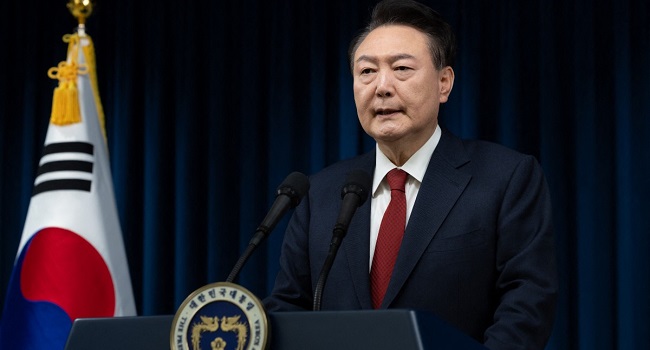
(JUST-IN) WORLD NEWS: SOUTH KOREAN PRESIDENT BANNED FROM LEAVING COUNTRY
Less than a week after briefly enforcing martial law and plunging the nation into disarray, South Korean President Yoon Suk Yeol was prohibited from leaving the country on Monday, according to the justice ministry.
On the evening of December 3, Yoon dispatched special soldiers and helicopters to parliament, but MPs compelled him to revoke the order when they rejected his declaration.
Huge crowds braved frigid weather to demand the removal of the highly unpopular leader, who narrowly survived an impeachment motion in parliament on Saturday.
Nevertheless, Yoon and his close associates have been the target of numerous investigations, including one into alleged mutiny, even though they are still in office.
Yoon became the first current South Korean president to be prohibited from leaving the nation, the Ministry of Justice revealed on Monday.
At a parliamentary hearing on Monday, a politician was questioned about whether Yoon had been prohibited from leaving the nation. “That’s correct,” said Bae Sang-up, a ministry commissioner for immigration services.
Former Interior Minister Lee Sang-min and former Defence Minister Kim Yong-hyun, who is presently in jail, are both prohibited from travelling due to their involvement in last week’s events.
Yeo In-hyung, the defence counterintelligence commander, and General Park An-su, the official in charge of the martial law operation, are also prohibited from leaving the nation.
On Monday, investigators brought Park in for additional interrogation.
After members of Yoon’s own People Power Party (PPP) left parliament, depriving the party of the required two-thirds majority, the impeachment attempt was unsuccessful.
According to the PPP, the opposition has erupted in protest after Yoon, 63, agreed to cede power to the prime minister and party chief in exchange.
Democratic Party floor leader Park Chan-dae declared on Monday that the second rebellion and coup were illegal and unconstitutional.
Unless he or she is incapacitated, resigns, or steps down, the president of South Korea is still the head of state and the commander in chief of the army, according to the country’s constitution.
In such a case, power would then be handed to the prime minister on an interim basis until elections could be held.
Claiming that Yoon can remain in office but has delegated his powers to the prime minister and leader of his ruling PPP — who is not an elected official — is “a blatant constitutional violation with no legal basis”, Park said.
“Their attitude of placing themselves above the constitution mirrors that of insurrectionist Yoon Suk Yeol,” he said.
The defence ministry confirmed on Monday that the embattled Yoon remained at the head of the country’s security apparatus, despite the apparent power vacuum in a country that remains technically at war with nuclear-armed North Korea.
“Legally, (control of military forces) currently lies with the commander in chief,” Defence Ministry spokesperson Jeon Ha-kyou said.
Yoon has apologised for “anxiety and inconvenience” caused by his declaration of martial law but has not stepped down, saying instead he would entrust decisions about his fate to his party.
He also said he would accept all political and legal responsibility for the martial law fiasco.
There is no constitutional basis supporting the ruling party’s claim that Yoon can stay in office but hand over his power to unelected party officials, said Kim Hae-won, a constitutional law professor at Pusan National University Law School.
“It seems to resemble an unconstitutional soft coup,” he told AFP.
“If there are issues with the president, there are ways laid out in the constitution such as suspending the president from his duties, and then move on to proceedings set out in the constitution, such as impeachment,” he said.
The opposition has already said they would try again to impeach Yoon, with leader Lee Jae-myung saying another vote would be held on Saturday.
Huge crowds are expected to gather again outside the National Assembly building.
Yoon’s approval rating hit 11 per cent, a historic low for the unpopular president, according to a new Gallup poll commissioned by local media.
AFP
